Krypton: You Can Make A Great Superman Show Without The Man of Steel

Latest Top Trending World News , Top World Trending Stories, Hot News
The abuse of Facebook’s platform for political purposes is a problem that doesn’t stop at the U.S border. Governments around the world are continuing to wrestle with the implications of Cambridge Analytica’s acquisition of Facebook user data from the heart of Europe to the capitals of Latin America’s most populous nations.
In South America, several chapters are still being written into the public record of Facebook’s privacy privations. Some Latin American democracies are also beginning to investigate whether the data harvesting techniques associated with Cambridge Analytica (CA) were used in their electoral processes.
Facebook, Cambridge Analytica and South America: a recap
Brazil
The Brazilian Public Prosecutor’s Office started an investigation to clarify if Cambridge Analytica (CA) had illegal access to Facebook’s private information from millions of Brazillians through their subsidiary, a Sao Paulo-based consulting group named A Ponte Estratégia Planejamento e Pesquisa LTDA.
The investigation came as a result of Cambridge Analytica Chief Data Officer Dr Alex Tayler and Managing Director Mark Turnbull saying to an undercover journalist that the company was now targeting Brazil, among other countries. The Brazilian case is a big deal for Facebook because it is its third-largest market and has an election coming in seven months.
Argentina
Cambridge Analytica’s parent company, SCL Group, has an office in Buenos Aires which address matches with the office of an Argentinian agricultural enterprise called Blacksoil, according to the news outlet, Clarin. The article pointed out that Alexander Nix, former CA’s CEO, was friend of the owner of the company, Lucas Talamoni Grether with whom he had conducted business before.
The Argentinian National Electoral Chamber (CNE), which is in charge of overseeing the elections and auditing campaign contributions and expenses, initiated an “internal investigation” following the scandal revealed by British TV Channel 4. Political parties are accusing one another of using CA services in the 2017 midterm election but there is no hard evidence either supporting or refuting the allegations.
Mexico and Colombia
Mexico, the fifth largest market for Facebook, is also involved in the Cambridge Analytica debacle. In the same video that CA executives mention targeting Brazil, they admit having operated in Mexico using an app called Pig.Gi. Mexico’s general election are due on July 1st. The same app was used to access data from Colombian users, according to the tech site Hipertextual.
Nevertheless, Pig.Gi’s founder and CEO, Joel Phillips, admitted signing a deal with the data company but says the information never got to their hands and there is no evidence that the company had any access to personal data from Mexicans or Colombians, according to the same article.
Apart from being named by Alexander Nix in the video leak which blew up the scandal, there isn’t much empirical evidence of Cambridge Analytica actually tampering with South American electoral processes. However ineffectual Cambridge Analytica’s efforts have been, Facebook is still on the hook when it comes to “fake news” and misinformation in the region.
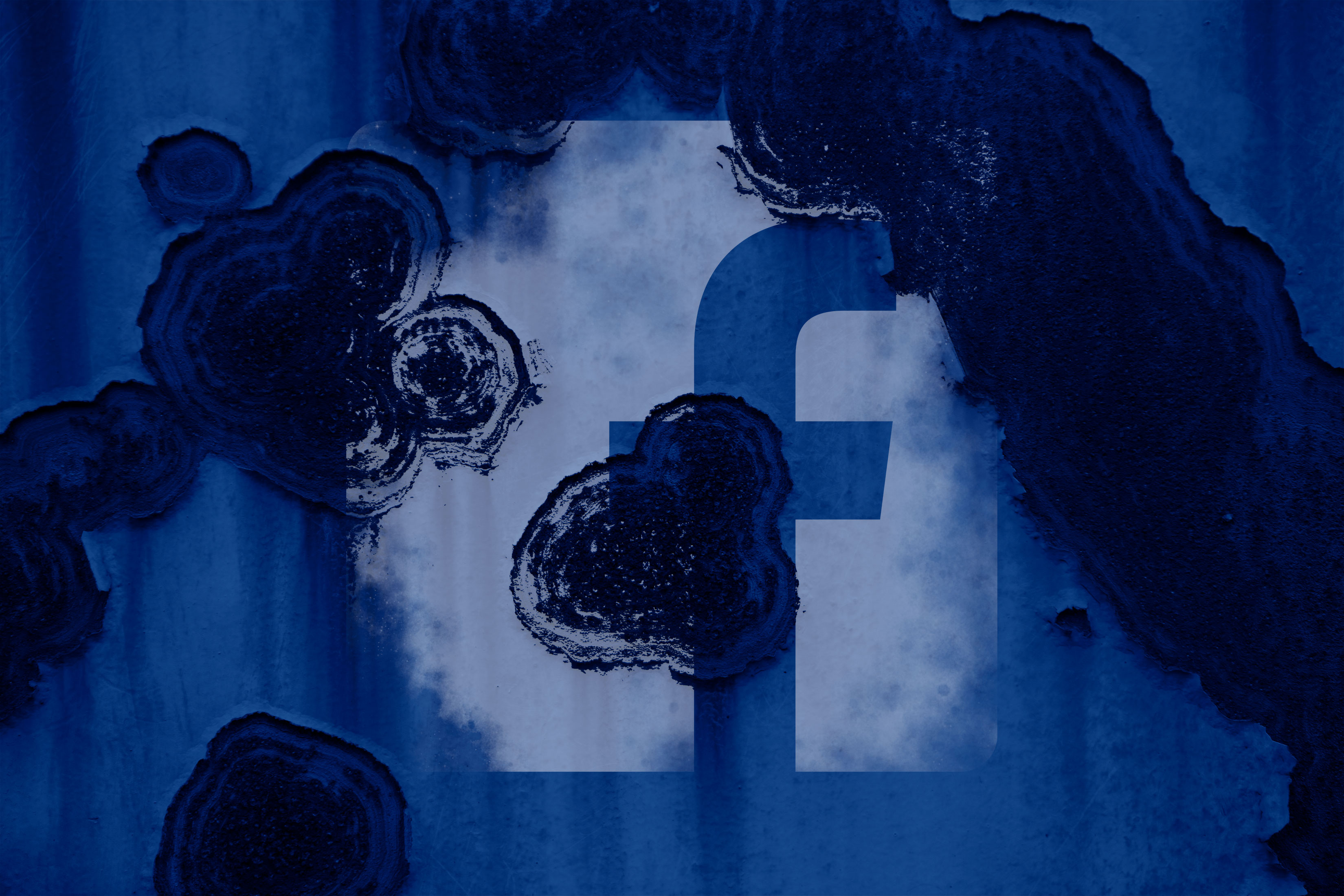
Misinformed emerging democracies
During the Argentinian electoral process in 2017 hundreds of fake articles were distributed through Facebook. A fact-checking site called Chequeado compiled some of the misinformation that was distributed on the platform.
Among them there were reports accusing the leader of a Teacher’s Union of not being a teacher; of the Buenos Aires Province Governor raising her own salary by 100% and even a claim that the US Government recorded Macri’s Administration as being the most corrupt in the world.
There were some sites created for the sole purpose of spreading Fake News on Facebook and these pieces went viral over and over again.
On the other hand, Brazil has steadily become a fake news heaven. The political instability that reigns in the country has made it easier for fake news to spread within fanatic circles. The Monitor Do Debate Politico No Meio Digital, an organization that follows the trail of political news in Social Networks, told El Pais that there are lots of sites which are not officially developing a systematic campaign of fake news prior to the October elections but have begun spreading fake reports in the social ecosystem.
This scheme is repeating itself throughout Latin American countries — and with the same characteristics. It’s not necessarily systemic, but it is growing. The difference remains in the plausibility of the pieces which were spread in the region.
Although there were no conspiracy theories that compared candidates to a reptile, in South America stories did aim to enhance what people already thought of political figures.
According to Luciano Galup, a social media strategist for political campaigns in the region, fake news are most effective in polarized societies. A study made by Oxford University in the US, showed that extremists tend to distribute more fake information than moderates within parties. And polarization is a major characteristic of the Latin American region’s political scenario. This makes Latin America the perfect victim for people trying to tamper with elections by presenting propaganda as actual news.
If we add that up with the lack of control from governments and Facebook attempts to solve the issue, we have a ticking time bomb. The only positive, Galup says, is that services like the ones on offer from Cambridge Analytica are prohibitively expensive for most political parties in Latin America.
In this case, the only thing saving elections in the region from outside corrupting influences may be the greed of those same corrupting influences.
These kinds of leaks didn’t happen when I started reporting on Facebook eight years ago. It was a tight-knit cult convinced of its mission to connect everyone, but with the discipline of a military unit where everyone knew loose lips sink ships. Motivational posters with bold corporate slogans dotted its offices, rallying the troops. Employees were happy to be evangelists.
But then came the fake news, News Feed addiction, violence on Facebook Live, cyberbullying, abusive ad targeting, election interference and, most recently, the Cambridge Analytica app data privacy scandals. All the while, Facebook either willfully believed the worst case scenarios could never come true, was naive to their existence or calculated the benefits and growth outweighed the risks. And when finally confronted, Facebook often dragged its feet before admitting the extent of the issues.
Inside the social network’s offices, the bonds began to fray. An ethics problem metastisized into a morale problem. Slogans took on sinister second meanings. The Kool-Aid tasted different.
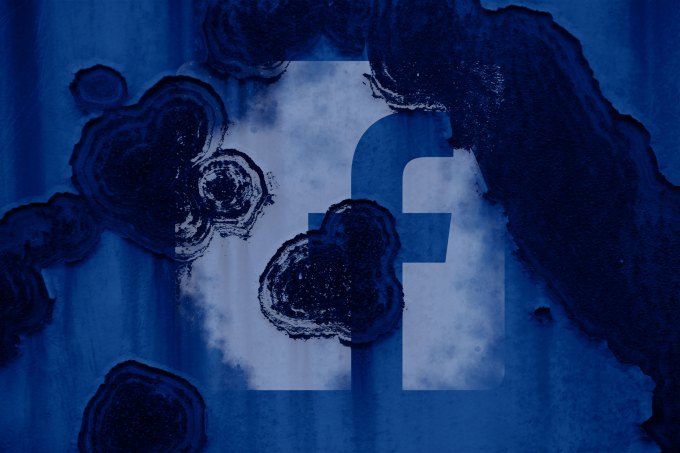
Some hoped they could right the ship but couldn’t. Some craved the influence and intellectual thrill of running one of humanity’s most popular inventions, but now question if that influence and their work is positive. Others surely just wanted to collect salaries, stock and resumé highlights, but lost the stomach for it.
Now the convergence of scandals has come to a head in the form of constant leaks.
The more benign leaks merely cost Facebook a bit of competitive advantage. We’ve learned it’s building a smart speaker, a standalone VR headset and a Houseparty split-screen video chat clone.
Yet policy-focused leaks have exacerbated the backlash against Facebook, putting more pressure on the conscience of employees. As blame fell to Facebook for Trump’s election, word of Facebook prototyping a censorship tool for operating in China escaped, triggering questions about its respect for human rights and free speech. Facebook’s content rulebook got out alongside disturbing tales of the filth the company’s contracted moderators have to sift through. Its ad targeting was revealed to be able to pinpoint emotionally vulnerable teens.
In recent weeks, the leaks have accelerated to a maddening pace in the wake of Facebook’s soggy apologies regarding the Cambridge Analytica debacle. Its weak policy enforcement left the door open to exploitation of data users gave third-party apps, deepening the perception that Facebook doesn’t care about privacy.
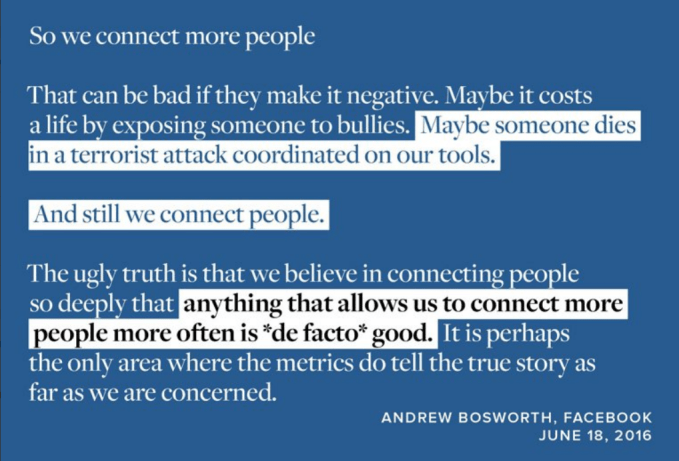
And it all culminated with BuzzFeed publishing a leaked “growth at all costs” internal post from Facebook VP Andrew “Boz” Bosworth that substantiated people’s worst fears about the company’s disregard for user safety in pursuit of world domination. Even the ensuing internal discussion about the damage caused by leaks and how to prevent them…leaked.
But the leaks are not the disease, just the symptom. Sunken morale is the cause, and it’s dragging down the company. Former Facebook employee and Wired writer Antonio Garcia Martinez sums it up, saying this kind of vindictive, intentionally destructive leak fills Facebook’s leadership with “horror”:
The fact that some Facebooker would place their personal grudge and views above the interests of the company fills anyone on the home team with horror (in the same way that the current administration colluding with foreigners to secure a domestic victory does Americans).
— Antonio García Martínez (@antoniogm) March 30, 2018
And that sentiment was confirmed by Facebook’s VP of News Feed Adam Mosseri, who tweeted that leaks “create strong incentives to be less transparent internally and they certainly slow us down,” and will make it tougher to deal with the big problems.
I’m really worried about this. I worry it’ll make it much more difficult to step up to the challenges we face.
— Adam Mosseri (@mosseri) March 30, 2018
Those thoughts weigh heavy on Facebook’s team. A source close to several Facebook executives tells us they feel “embarrassed to work there” and are increasingly open to other job opportunities. One current employee told us to assume anything certain execs tell the media is “100% false.”
If Facebook can’t internally discuss the problems it faces without being exposed, how can it solve them?
The consequences of Facebook’s failures are typically pegged as external hazards.
You might assume the government will finally step in and regulate Facebook. But the Honest Ads Act and other rules about ads transparency and data privacy could end up protecting Facebook by being simply a paperwork speed bump for it while making it tough for competitors to build a rival database of personal info. In our corporation-loving society, it seems unlikely that the administration would go so far as to split up Facebook, Instagram and WhatsApp — one of the few feasible ways to limit the company’s power.
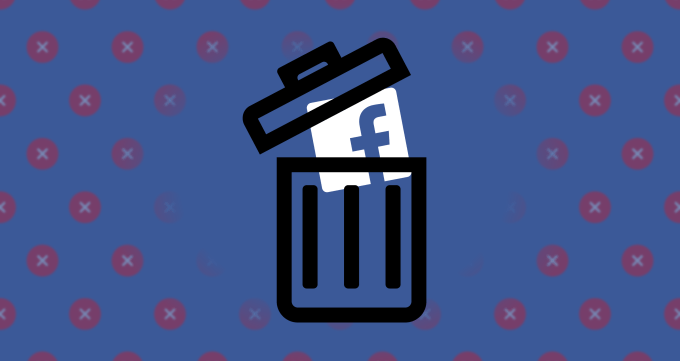
Users have watched Facebook make misstep after misstep over the years, but can’t help but stay glued to its feed. Even those who don’t scroll rely on it as a fundamental utility for messaging and login on other sites. Privacy and transparency are too abstract for most people to care about. Hence, first-time Facebook downloads held steady and its App Store rank actually rose in the week after the Cambridge Analytica fiasco broke. In regards to the #DeleteFacebook movement, Mark Zuckerberg himself said “I don’t think we’ve seen a meaningful number of people act on that.” And as long as they’re browsing, advertisers will keep paying Facebook to reach them.
That’s why the greatest threat of the scandal convergence comes from inside. The leaks are the canary in the noxious blue coal mine.
If employees wake up each day unsure whether Facebook’s mission is actually harming the world, they won’t stay. Facebook doesn’t have the same internal work culture problems as some giants like Uber. But there are plenty of other tech companies with less questionable impacts. Some are still private and offer the chance to win big on an IPO or acquisition. At the very least, those in the Bay could find somewhere to work without a spending hours a day on the traffic-snarled 101 freeway.
If they do stay, they won’t work as hard. It’s tough to build if you think you’re building a weapon. Especially if you thought you were going to be making helpful tools. The melancholy and malaise set in. People go into rest-and-vest mode, living out their days at Facebook as a sentence not an opportunity. The next killer product Facebook needs a year or two from now might never coalesce.
And if they do work hard, a culture of anxiety and paralysis will work against them. No one wants to code with their hands tied, and some would prefer a less scrutinized environment. Every decision will require endless philosophizing and risk-reduction. Product changes will be reduced to the lowest common denominator, designed not to offend or appear too tyrannical.
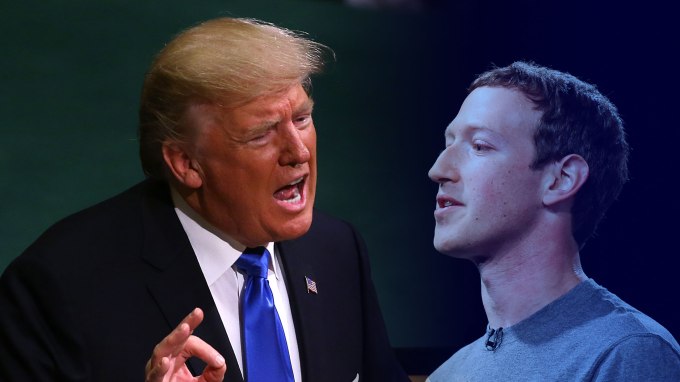
Source: Volkan Furuncu/Anadolu Agency + David Ramos/Getty Images
In fact, that’s partly how Facebook got into this whole mess. A leak by an anonymous former contractor led Gizmodo to report Facebook was suppressing conservative news in its Trending section. Terrified of appearing liberally biased, Facebook reportedly hesitated to take decisive action against fake news. That hands-off approach led to the post-election criticism that degraded morale and pushed the growing snowball of leaks down the mountain.
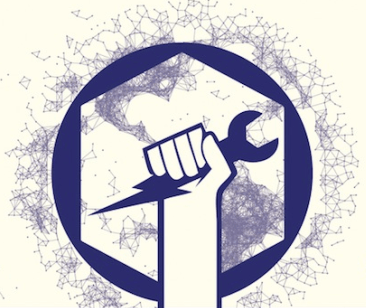 It’s still rolling.
It’s still rolling.
How to stop morale’s downward momentum will be one of Facebook’s greatest tests of leadership. This isn’t a bug to be squashed. It can’t just roll back a feature update. And an apology won’t suffice. It will have to expel or reeducate the leakers and those disloyal without instilling a witch hunt’s sense of dread. Compensation may have to jump upwards to keep talent aboard like Twitter did when it was floundering. Its top brass will need to show candor and accountability without fueling more indiscretion. And it may need to make a shocking, landmark act of contrition to convince employees its capable of change.
When asked how Facebook could address the morale problem, Mosseri told me “it starts with owning our mistakes and being very clear about what we’re doing now” and noted that “it took a while to get into this place and I think it’ll take a while to work our way out . . . Trust is lost quickly, and takes a long time to rebuild.”
I think it starts with owning our mistakes and being very clear about what we’re doing now. For much of the company November 2016 was their first negative cycle, so it’s also good to share old stories. And then you have to deliver, you have to make real progress on the issues.
— Adam Mosseri (@mosseri) March 30, 2018
This isn’t about whether Facebook will disappear tomorrow, but whether it will remain unconquerable for the forseeable future.
Growth has been the driving mantra for Facebook since its inception. No matter how employees are evaluated, it’s still the underlying ethos. Facebook has poised itself as a mission-driven company. The implication was always that connecting people is good so connecting more people is better. The only question was how to grow faster.
Now Zuckerberg will have to figure out how to get Facebook to cautiously foresee the consequences of what it says and does while remaining an appealing place to work. “Move slow and think things through” just doesn’t have the same ring to it.
If you’re a Facebook employee or anyone else that has information to share with TechCrunch, you can contact us at Tips@techcrunch.com or this article’s author Josh Constine’s DMs are open on Twitter. Here are some of our feature stories on Facebook’s recent issues:
A company called Clipisode is today launching a new service that’s essentially a “talk show in a box,” as founder Brian Alvey describes it. Similar to how Anchor now allows anyone to build a professional podcast using simple mobile and web tools, Clipisode does this for video content. With Clipisode, you can record a video that can be shared across any platform – social media, the web, text messages – and collect video responses that can then be integrated into the “show” and overlaid with professional graphics.
The video responses feature is something more akin to a video voicemail-based call-in feature.
Here’s how it works. The content creator will first use Clipisode to record their video, and receive the link to share the video across social media, the web, or privately through email, text messaging, etc. When the viewer or guest clicks the link, they can respond to the question the show’s “host” posed.
For example, a reporter could ask for viewers’ thoughts on an issue or a creator could ask their fans what they want to see next.
How the video creator wants to use this functionality is really up to them, and specific to the type of video show they’re making.
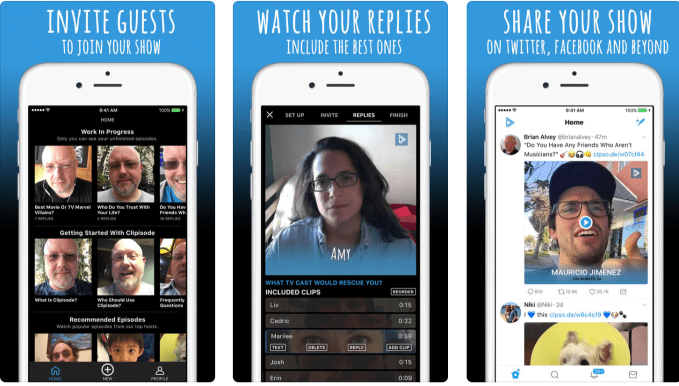
To give you an idea, during a pre-launch period, the app has been tested by AXS TV to promote their upcoming Top Ten Revealed series by asking music industry experts “Who Is Your All-time Favorite Guitarist?”
BBC Scotland asked their Twitter followers who they want to see hired as the new manager for the Scotland national football team.
Who do you want as the next Scotland manager?
We asked and you told us.
Watch here
Watch my #Clipisode: "Sportscene Extra – Scotland Manager"
https://t.co/E28dfSrlIi— Jonathan Sutherland (@BBCjsutherland) February 8, 2018
A full-time Twitch gamer, Chris Melberger asked his subscribers what device they watch Twitch on.
The content creator can then receive all the video responses to these questions privately, choose which ones they want to include in their finished show, and drag those responses into the order they want. The creator can respond back to the clips, too, or just add another clip at the end of their video. Uploading pre-recorded clips from services like Dropbox or even your phone is supported as well.
Our Top Ten Revealed experts @josemangin @EddieTrunk @KevinBlatt @lyndseyparker @PeteGiovine made a Webisode highlighting their favorite guitarists to get you excited for the show!
Set your DVR for the premiere SUNDAY –> https://t.co/G9JlpvAoAA pic.twitter.com/Izqc1wu3Zv
— AXS TV (@AXSTV) February 10, 2018
Plus, content creators can use Clipisode to overlay professional-looking animations and graphics on top of the final video with the responses and replies. This makes it seem more like something made with help from a video editing team, not an app on your phone.
Because Clipisode invitations are web links, they don’t require the recipients to download an app.
“[People] don’t want to download an app for a one-time video reply,” explains Alvey. “But with this, people can reply.” And, he adds, what makes Clipisode interesting from a technical perspective, is that the web links users click to reply can work in any app in a way that feels seamless to the end user.
“That’s our biggest trick – making this work in other people’s apps, so there’s no new social network to join and nothing to download,” he says.
The app is free currently, but the plan is to generate revenue by later selling subscription access to the authoring suite where users can create the animated overlays and branding components that give the video the professional look-and-feel.
In an online CMS, creators can author, test and deploy animated themes that run on top of their videos.
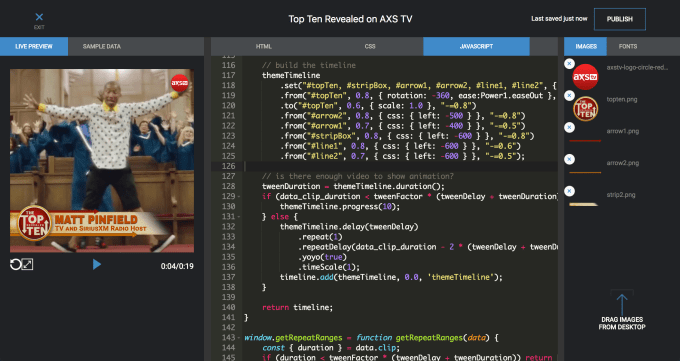
The final video product can be shared back to social media, or downloaded as a video file to be published on video-sharing sites, social media, or as a video podcast.
Clipisode has been in development for some time, Alvey says. The company originally raised less than a million from investors including Mike Jones and Mark Cuban for a different product the founder describes as a Patreon competitor, before pivoting to Clipisode. Investors funded the new product with less than half a million.
The app itself took a couple of years to complete, something that Alvey says has to do with the animation studio it includes and the small team. (It’s just him and technical co-founder Max Schmeling.)
Clipisode is a free download on iOS and Android.
Whenever you are doing something online that requires you to present an official ID like a passport or driver’s license to complete the transaction, it presents risk to both parties. Consumers want to know they are secure and brands want to know the person is using valid credentials. That’s where Veriff comes in.
Kaarel Kotkas, CEO and founder of the company, says the goal is to be “the Stripe of identity.” What he means is he wants to provide developers with the ability to embed identity verification into any application or website, as easily as you can use Stripe to add payments.
The company, which was originally launched in Estonia in 2015, is a recent graduate of the Y Combinator winter class. When you undertake any activity on the web or a mobile app that requires a valid ID, if Veriff is running under the hood, you can submit an ID such as a driver’s license. It uses a secret sauce to determine that the ID being presented is an officially issued one and that it belongs to the person in question.
When you consider that there were over 15 million identity thefts in the US in 2016 alone, you know it’s not a simple matter to identify a forgery. Fake IDs can be quite good and it’s often difficult to identify fraudulent ones with the naked eye.

It’s hard to tell the difference between the real and fake IDs in this shot. Photo: Veriff
If you want to open a bank account online for instance, you have to provide proof of identity for the bank. With Veriff, you take a picture of yourself, then submit a picture of your official ID and Veriff analyzes it to make sure it’s valid.
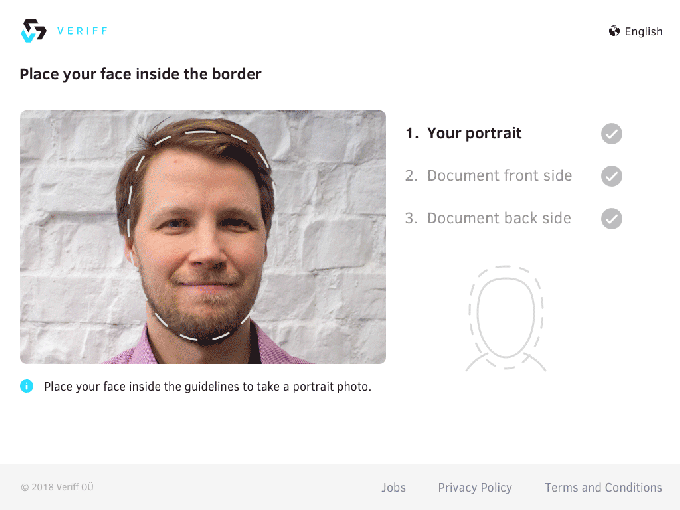
The idea is to make the ID process easy and quick for the consumer, while providing an accurate way for the brand to check IDs online. Consumers also benefit because someone can’t use their identity online to get credit or other services.
If there is an issue with the ID, the person can be directed to a human for a video chat where they can discuss it if need be.
The company currently has 20 customers and is on track to do $100,000 in revenue this month, according to data they provided at their Y Combinator Demo Day presentation. They plan to make money by charging $1 per verification.